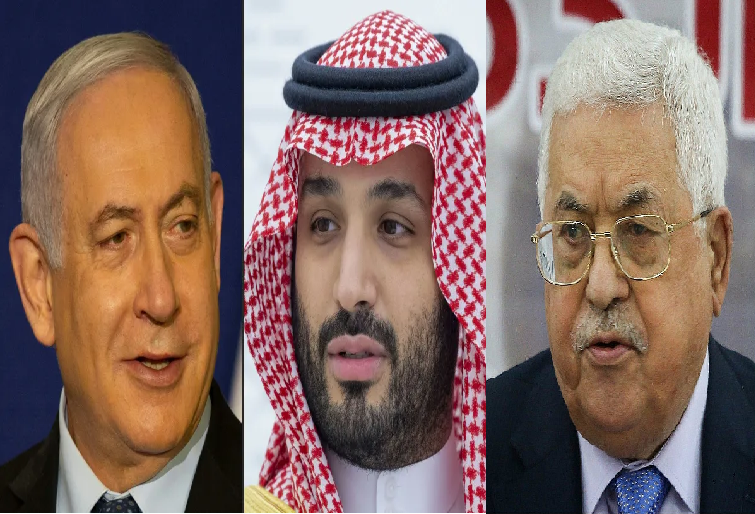
- Riyadh’s leadership in regional diplomacy and its strategic calculations regarding normalization with Israel will continue to shape the trajectory of events in the Middle East.
- Crown Prince Mohammad bin Salman’s reaffirmation of the kingdom’s support for a two-state solution underscores Riyadh’s commitment to a just and lasting resolution to the conflict.
- The kingdom’s efforts to resolve regional conflicts, including the ongoing crisis in Gaza, reflect its broader commitment to stability and prosperity in the Middle East.
Amidst the ongoing Israel-Gaza conflict, Saudi Arabia finds itself at the centre of a delicate diplomatic position, balancing domestic sentiment, regional geopolitics, and its strategic interests. As the conflict persists, Riyadh’s approach reflects a nuanced strategy aimed at maintaining stability while advancing its broader foreign policy objectives.
Saudi Arabia’s journey towards normalization with Israel, once seen as a promising prospect, hit a roadblock following the outbreak of hostilities between Israel and Hamas. Before the conflict, discussions between Riyadh and Tel Aviv, facilitated by the United States, hinted at a potential breakthrough in regional diplomacy. However, the deadly Hamas attack in early October disrupted these talks, forcing Riyadh to reassess its position in light of escalating tensions.
The Saudi public, like many across the Arab world, has been deeply affected by the images of devastation emerging from Gaza. Despite restrictions on public demonstrations, social media platforms have become channels for expressing outrage and solidarity with the Palestinian cause. In this context, Riyadh faces the challenge of balancing public sentiment with its strategic imperatives, particularly in the realm of foreign policy.
In response to the crisis, Saudi Arabia has assumed a leadership role in regional diplomacy, hosting the Arab-Islamic summit in Riyadh and calling for an immediate halt to Israel’s military operations in Gaza. Crown Prince Mohammad bin Salman’s reaffirmation of the kingdom’s support for a two-state solution underscores Riyadh’s commitment to a just and lasting resolution to the conflict. However, the kingdom’s diplomatic efforts are also characterized by pragmatism, as it seeks to advance its interests while avoiding further escalation.
One notable aspect of Saudi Arabia’s response to the conflict has been its call for an arms embargo on Israel. While this gesture may have limited practical impact, it serves as a symbolic expression of solidarity with the Palestinian people and a signal of Riyadh’s willingness to take a stand against Israeli aggression. However, the effectiveness of such measures remains subject to debate, particularly in light of Israel’s strong military ties with other countries.
Despite the current freeze in normalization talks, Saudi Arabia remains open to the prospect, recognizing the potential benefits of closer ties with Israel. For Riyadh, normalization represents an opportunity to strengthen its alliance with the United States, enhance regional security, and unlock economic opportunities. However, several obstacles, including Saudi demands for a comprehensive peace process and concerns about its human rights record, complicate the path forward.
Under the ambitious Vision 2030 initiative, Saudi Arabia has sought to diversify its economy and enhance its global standing through diplomatic engagement. The kingdom’s efforts to resolve regional conflicts, including the ongoing crisis in Gaza, reflect its broader commitment to stability and prosperity in the Middle East. As Riyadh continues to pursue its vision for the future, its role in regional diplomacy is likely to evolve, shaped by changing geopolitical dynamics and strategic imperatives.
As the conflict persists, Riyadh’s leadership in regional diplomacy and its strategic calculations regarding normalization with Israel will continue to shape the trajectory of events in the Middle East. Despite the challenges ahead, Saudi Arabia remains committed to finding a peaceful resolution to the conflict and advancing its broader foreign policy objectives in the region.
References:
- What War in Gaza means for Saudi Arabia: https://www.foreignaffairs.com/middle-east/what-war-gaza-israel-means-saudi-arabia
- How the Gaza War is Reshaping Saudi Views on Israel: https://amwaj.media/media-monitor/how-the-gaza-war-is-shaping-saudi-views-on-israel
- How Saudi Arabia Could Use Its Leverage in Gaza: https://foreignpolicy.com/2023/12/18/saudi-arabia-israel-gaza-mbs-leverage/
